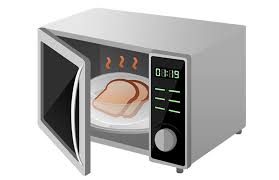
Over Spring Break, I had a less than great sales experience. My family and I are in the midst of substantial remodeling, and on the second Saturday of Break, we headed to Home Depot to pick up some drywall. Naturally, as one does, we ended up looking at a variety of other sections while we were there, which is how we ended up in this whole microwave situation. We came for the drywall and left with a microwave, well kind of.
Now this story is not all negative, there were positives of this experience as well, and I will lay them all out now. As my family was browsing the appliances section, a sales representative approached us. She followed good sales techniques by asking us questions and allowing us to talk about what we were wanting in a microwave, and then showed us some options that seemed to fit what we were looking for. She even looked up additional information on some of the benefits once we had narrowed down the ones we were considering for purchase. Once we made our selection the sales representative told us that the microwave was in stock, and she would put it out for us. So, we went to the front and checked out with our drywall and microwave. You would think this story is over now, but you would be wrong my friend!
We loaded our purchases into the truck and then realized that we had been given the wrong microwave. The microwave we had wanted was a different model and therefore had some different features. So, we headed back into the store to get things straightened out. We were directed to customer service, and that was when the real fun began. The customer service representative seemed confused as to whether or not the microwave we wanted was in stock and what to do about our situation in general. She was nice and polite, but not very helpful. Finally, she gave us store credit, and we were able to return the one that we had not wanted. She then proceeded to order us the correct one, but once again, she did not seem to know how to do it. She told us we could not have the microwave delivered to the store and would have to get it delivered to our house. This would be fine, but everyone in my family would be at work when it arrived and would be unable to sign for it. She said she had no other solution for us. We finally relented, she then told us that we would have to pay $60 to have it shipped to our house, which we hadn’t even wanted in the first place. This caused us to cancel our order altogether.
We then decided to return to the appliance section and speak with the sales representative who had helped us earlier regarding the matter. She was once again very helpful. She told us that she could order the microwave and have it sent to the store. She quickly put the order in and started the payment process. Then something went wrong and, we were told we would have to return in 20 minutes to complete the payment process. That is what we did, and we finally should be getting a microwave delivered soon!
Overall, this sales experience left us frustrated and took up a lot of time that could have been used actually working on remodeling the house. Though some good sales techniques were used, there were many frustrating points as well. But, hey, at least now we will hopefully have the correct microwave!
A great example of poor customer service causing frustration! The customer service representative obviously did not know much about her job and was difficult to try and work with. The sales rep was much more knowledgeable and therefore much easier to work with, even with few mistakes. This really shows the importance of training employees in all aspects of your business.
That sounds like a typical Lowe’s/Home Depot experience in our family, probably more due to ourselves than the employees. But the confusion in a sales process is never good as it often frustrates the customer, which greatly heightens the chances of loosing the sale. Asking questions and being an expert on the solution will take away from confusion, rather than add to it, distinguishing someone as a great salesperson.
This makes me think of Coach DiDonatto’s two aspects of trust: ability and intent. Often I think salespeople lack the right intent, but its sounds like here they were missing the ability aspect.